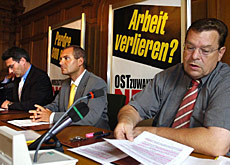
Opponents of labour accord raise their voices

A committee against extending a labour accord to the new European Union members says unemployment will go up and salaries down if it's accepted by voters.
The government, the business community, unions and the Swiss Farmers’ Association have already come out in favour of extending the bilateral treaty with Brussels.
The committee for “safe jobs and healthy social insurances” issued its warning at a news conference in Bern on Friday ahead of a nationwide vote on September 25.
It came only four days after the government’s campaign in favour of extending the accord, which if approved, would be included in Switzerland’s bilateral treaties with the EU.
The cabinet has reassured voters that Switzerland can handle opening its market to mostly eastern European workers.
Three of the four parties in the government – the centre-right Radicals and Christian Democrats, as well as the centre-left Social Democrats – support the cabinet position, while the rightwing People’s Party is against.
Free access
Opponents say that if people voted “yes”, thousands of workers from eastern Europe would have free access to Switzerland’s labour market and social security.
The committee includes parliamentarians from the People’s Party, the far-right Lega dei Ticinesi and the Swiss Democrats, as well as representatives from the isolationist Campaign for an Independent and Neutral Switzerland.
The Lega’s Attilio Bignasca said the government, employers’ associations and unions had all minimised the danger.
“Someone from eastern Europe would only have to work one year in Switzerland to get full access to [Swiss] unemployment benefit,” he said.
The committee argues that one of the main reasons for Switzerland’s prosperity is that it has always decided for itself who may immigrate and work in the country, benefitting from its “generous” social institutions.
This, it says, could change after the vote at a time when “more and more Swiss are losing their jobs to foreigners who are satisfied with lower wages”.
The committee describes the new EU members as countries “suffering from massive unemployment and have extremely low wages, a gross national product only a fraction of Switzerland’s, as well as rudimentary social institutions”.
Support
The Swiss Association of Small- and Medium-Sized Enterprises and the Swiss Farmers’ Association joined forces on Friday to support the treaty extension.
The two organisations said that they represented companies and businesspeople that depended on foreign workers for their survival.
In case of a “no” vote they argued that all the bilateral accords with the EU would be in “great danger” and the consequences would be “devastating” for the Swiss economy.
A press release said that after years of stagnation, the economy needed a boost to encourage growth.
swissinfo with agencies
The Swiss will vote on the extension of the free movement of people to the ten new members of the EU on September 25.
It has already been approved by the Swiss parliament.
The issue goes before voters because the far-right Swiss Democrats collected 92,901 signatures to force a referendum.
The bilateral agreement between Switzerland and the EU on the free movement of people came into force on June 1, 2002.
This eases residence and working restrictions on Swiss and residents of the 15 old EU member states.
The agreement should also apply to the ten countries that joined the EU on May 1, 2004: Estonia, Latvia, Lithuania, Poland, Slovakia, Slovenia, the Czech Republic, Hungary, Cyprus and Malta.

In compliance with the JTI standards
More: SWI swissinfo.ch certified by the Journalism Trust Initiative




























You can find an overview of ongoing debates with our journalists here . Please join us!
If you want to start a conversation about a topic raised in this article or want to report factual errors, email us at english@swissinfo.ch.